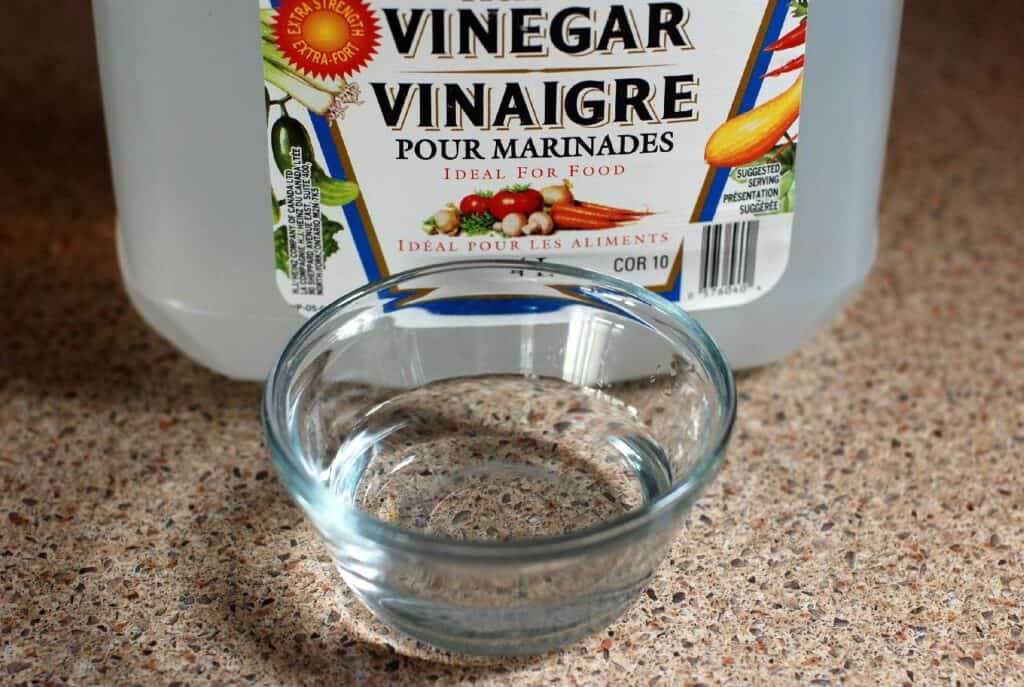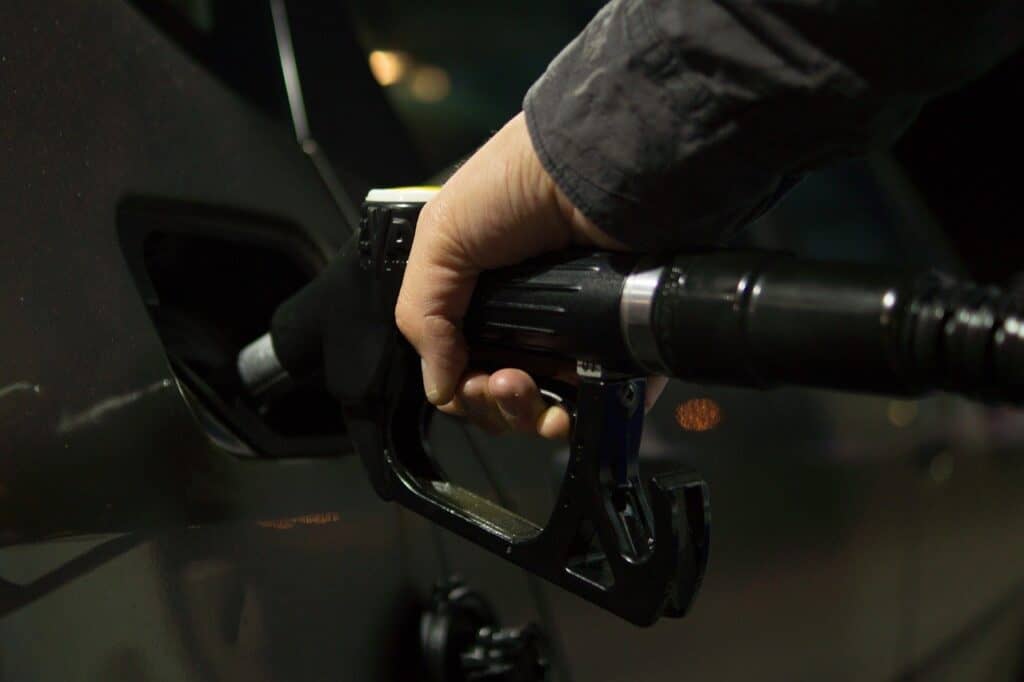Vinegar is an essential part of most people’s culinary routines. From the British favorite fish and chips, which is never the same without it, to the Filipino Pork Adobo, vinegar reinvigorates a meal and brings a biting freshness that can’t be matched. But if you were to drop a match into a bottle of vinegar would you suddenly have a raging inferno on your hands? After all vinegar is made from old alcohol, right?
Vinegar is not usually flammable and will not readily catch fire. Although vinegar contains acetic (ethanoic) acid, which is very flammable, most vinegar contains only 5% to 20% acetic acid. This is not a high enough concentration to sustain a fire.
Lets look at the different types of vinegar more closely and see what could make it flammable or not. Check it out.
Your # 1 priority is keeping your family safe. As a firefighter, I recommend everyone has updated smoke detectors that don’t require battery changes, like these ones from Kidde, a fire extinguisher, like this one from Amerex, and a fire escape ladder if you have bedrooms above the first floor, I recommend this one from Hausse.
Also read: What Makes Something Flammable?
What Is Vinegar? (Chemically)

Vinegar is most easily made by allowing old wine or beer to stand for a long period of time. The alcohol within is converted into acetic (or ethanoic) acid and that’s what gives vinegar its distinct taste.
However, you can cut out the middleman and turn sugar into vinegar by fermentation and that’s what tends to happen in the industrial production of vinegar. You can use nearly any fruit or vegetable to start a vinegar-making process – you can even use orange peel!
When the vinegar is finished, it tends to consist of 5-20% acetic acid, and the rest is mainly water (though there may be some colored chemicals or other minor flavors present such as flavonoids, phenolic acid and aldehydes).
Vinegar is thus one of the easiest acids to manufacture and it is used not just for cooking, but also in a variety of cleaning and folk medicine products.
People have been making vinegar since at least the year 3,000 BC and the Babylonians used it to cook with and to treat wounds.
Also read: Is Baking Soda Flammable? What About Baking Powder?
Can It Catch On Fire?
Most vinegar will not catch fire, due to low acetic acid content.
That’s because vinegar is mostly water and as everyone knows, water doesn’t catch fire, it extinguishes it.
Of course, you could eventually heat up vinegar enough for the acetic acid to vaporize, and then it might be flammable, but you’d have to work hard to do so.
Vinegar can theoretically speaking, catch fire because everything can catch fire if you make it hot enough. Eventually, with enough heat, all compounds break down into their individual elements and there’s carbon, oxygen, and hydrogen in ethanoic acid and they all burn.
But in practice, it is never going to get hot enough to break vinegar down into its constituent elements, at least not outside of very controlled environments and that means as a mixture which is about 95% water; vinegar won’t catch fire.
In fact, it will evaporate completely before it catches fire.
Also read: Is Salt Flammable? Will it Catch on Fire?
What About Household Vinegar?
Household vinegar is very much the same as any other kind of vinegar and thus, it contains too much water and not enough acetic acid to be flammable.
You can’t just evaporate the water off, either, to concentrate the vinegar and make it flammable, as the ethanoic acid will evaporate long before the water will.
So, household vinegar cannot be made into a flammable liquid under ordinary circumstances.
Also read: Is Mayonnaise Flammable? Will it Burn?
Is Acetic Acid Flammable?
Pure acetic acid is flammable and will easily catch fire. Acetic acid has a flashpoint of 104 degrees Fahrenheit (39 Celsius).
This is the main (active) ingredient in vinegar that creates the fermented flavor. At stronger concentrations than is found in vinegar, it is flammable and can definitely be a fire hazard.
Also read: Is Water Flammable? You May Be Surprised…
Is It Dangerous To Inhale Vinegar Fumes?
Under ordinary circumstances, it’s probably relatively safe to inhale a small amount of vinegar fumes. In fact, it may even make you hungry.
However, it’s worth noting that vinegar fumes can be dangerous in large quantities, as it can displace the oxygen that you need to breath,
If you were to get an industrial sized vat of vinegar and allow the fumes to build up over it without any ventilation to carry them away – you would eventually find yourself unable to breathe and die.
So, smelling vinegar is fine, but I do not recommend inhaling large amounts.
Also read: Is Urine/Pee Flammable? Can It Start a Fire?
Is Boiling Vinegar Safe?
It is safe to boil vinegar, as long as you are in a well-ventilated area to avoid large amounts of fumes.
Also do not boil the vinegar over a coal fire.
Two people in China made that mistake and sadly for them, it wasn’t the vinegar that killed them, it was the carbon monoxide generated by burning coal.
So, no coal fires in the kitchen.
Also read: Is Olive Oil Flammable? Can it Catch Fire?
Is It Flammable In An Oven?
Vinegar is not flammable in an oven.
You could, in theory, concentrate the ethanoic acid with hours and hours of cooking time but, in reality, you’d never get it concentrated enough to actually catch fire and any vapor created would simply disperse too.
Also read: Are All Oils Flammable? [Cooking, Motor, Mineral, Essential]
Is It Flammable In A Microwave?
Vinegar is not flammable in a microwave.
A microwave oven cooks using radiation to stimulate individual molecules (usually water molecules) to give them energy so that they warm the dish from the center of mass outwards.
Regardless of how it is heated, vinegar does not have enough acetic acid to be flammable.
Also read: Can Essential Oils Catch Fire? Are They Flammable?
What About In A Dryer?
No, vinegar is not flammable in a dryer.
Though we wouldn’t recommend experimenting with this. Just because it’s likely to corrode your dryer.
Is Apple Cider Vinegar Flammable?

Apple cider vinegar is not flammable as it only has 5 to 6% acetic acid.
Apple cider vinegar may be reputed for having incredible health properties, but it’s no different, chemically, from any other kind of vinegar and it too is mainly water and thus it’s not flammable.
Also read: Is Aluminum Foil Flammable? Can it Burn or Melt?
Cooking Vinegar?
Cooking vinegar is not flammable as it is usually only 4 to 8% acetic acid.
We would consider cooking vinegar to be a standard household vinegar and like all household vinegar, the water content ensures that cooking vinegar isn’t flammable. Neither is malt vinegar, spirit vinegar, or any other kind of commonly used vinegar.
Related Articles
Is Beer Flammable? Will it Catch Fire?

